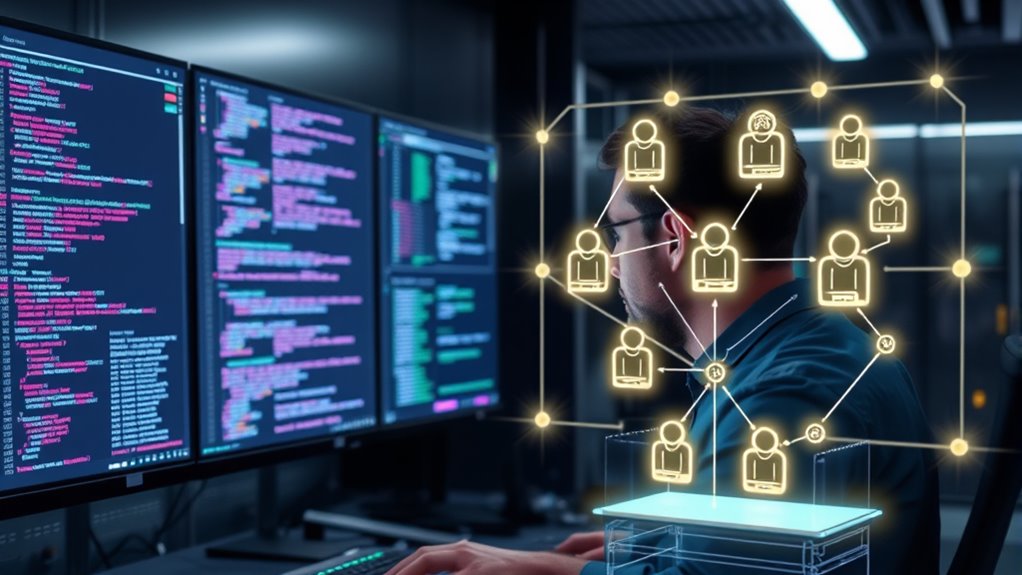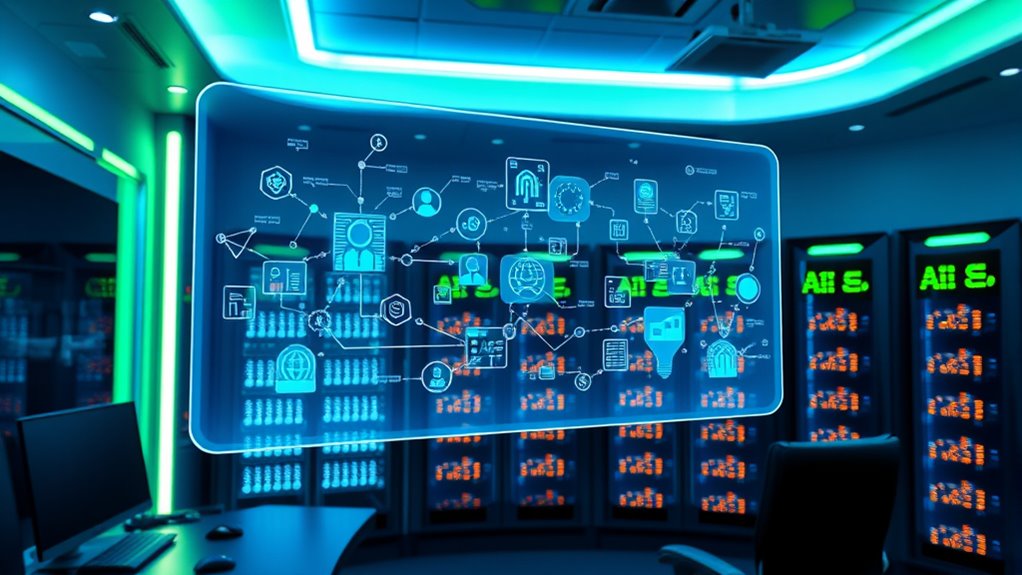AI agents play a crucial role in CI/CD pipelines by automating testing and security tasks, which speeds up development and reduces manual errors. They dynamically adapt to code changes, uncovering subtle bugs and potential vulnerabilities across environments. These intelligent tools seamlessly integrate with your existing workflows, offering real-time insights and automating routine tasks. If you want to understand how AI transforms your pipeline, keep exploring the ways it enhances efficiency, security, and innovation.
Key Takeaways
- AI agents automate testing, ensuring faster, more thorough validation within CI/CD workflows.
- They continuously monitor code for vulnerabilities, enhancing security during development cycles.
- AI agents adapt and optimize processes over time by learning from test results and security incidents.
- They seamlessly integrate with existing tools, automating routine tasks and providing actionable insights.
- AI-driven automation accelerates delivery cycles while maintaining high quality and security standards.

AI agents are transforming CI/CD pipelines by automating complex tasks and enhancing decision-making processes. When you leverage AI, you gain the ability to streamline automation testing, making it faster and more dependable. Instead of manually writing and executing tests, AI-driven tools can generate, run, and analyze tests automatically. This not only accelerates the development cycle but also uncovers bugs you might miss with traditional methods. AI agents can identify subtle issues across various environments, reducing the risk of faulty releases. They adapt tests dynamically based on code changes, ensuring your testing remains thorough without requiring constant manual intervention. Additionally, high refresh rates enhance the responsiveness and accuracy of real-time testing and monitoring, providing more reliable feedback during development. As a result, your team can focus on higher-level tasks, confident that testing is both exhaustive and efficient.
Security auditing is another critical area where AI agents are proving invaluable. In a rapidly evolving threat landscape, staying ahead of vulnerabilities is challenging, but AI can help you monitor and evaluate your codebase continuously. These agents scan your applications for security flaws, misconfigurations, and compliance issues in real-time. By analyzing patterns and historical data, they can predict potential vulnerabilities before they’re exploited. This proactive approach to security auditing means you don’t have to wait for a breach or a manual review to identify risks. AI-powered security tools can flag suspicious activities, suggest remediation steps, and even automate some security fixes, reducing the window of exposure. This continuous security oversight helps you maintain a resilient defense posture throughout the development lifecycle. Incorporating machine learning algorithms further enhances their ability to detect complex security threats, making your defenses more robust.
Moreover, AI’s ability to learn from vast amounts of data enhances both automation testing and security auditing. As your CI/CD pipeline evolves, the AI agents adapt, improving their accuracy and efficiency over time. They analyze previous test results, security incidents, and code changes to optimize their processes. This adaptive learning ensures that your testing and security measures are always aligned with the latest threats and best practices. Additionally, AI agents can integrate seamlessly with existing tools, providing actionable insights without disrupting your workflow. By automating routine but critical tasks, they free up your team to focus on innovation and strategic improvements. This continuous learning further ensures that your processes stay current with emerging challenges.
Furthermore, the integration of AI with advanced processing power like Qualcomm’s Snapdragon 8 Gen 3 illustrates how AI is becoming more capable of supporting resource-intensive tasks, which can be leveraged within CI/CD pipelines for faster processing and analysis. In essence, AI agents elevate CI/CD pipelines from manual, error-prone processes to intelligent, automated systems that deliver faster, safer software. They empower you to conduct more thorough automation testing and security auditing, reducing risks and accelerating delivery cycles. As AI continues to evolve, you’ll find these tools becoming even more integrated, intuitive, and essential for modern software development. Embracing AI in your CI/CD pipeline isn’t just about keeping up; it’s about gaining a competitive edge through smarter, more secure, and efficient development practices.
Frequently Asked Questions
How Do AI Agents Impact Team Collaboration in Ci/Cd Processes?
AI agents impact your team collaboration in CI/CD processes by streamlining workflows and reducing manual tasks. They enhance team dynamics through real-time insights and automation, allowing you and your team to focus on more strategic work. This fosters a more collaborative environment where everyone stays aligned and productive. With AI handling repetitive tasks, communication improves, and your team can quickly adapt to changes, making the entire CI/CD pipeline more efficient and cohesive.
What Are the Security Challenges When Integrating AI Agents Into Pipelines?
When you integrate AI agents into your pipelines, security challenges arise, especially around data privacy and unauthorized access. You must guarantee sensitive data is protected from breaches and that AI systems are secure from malicious attacks. Regularly updating security protocols, enforcing strict access controls, and monitoring for suspicious activities help you mitigate risks and keep your pipeline safe from potential vulnerabilities.
Can AI Agents Replace Human Decision-Making in Ci/Cd Workflows?
While AI agents can automate many tasks, they can’t fully replace human decision-making in CI/CD workflows. You might depend on automation for efficiency, but ethical considerations and complex judgments still require human insight. Relying solely on AI risks over-dependency, overlooking nuances, and missing ethical implications. So, instead of replacement, see AI as a tool that enhances your decisions, supporting, not substituting, your expertise.
How Do AI Agents Adapt to Evolving Codebases Over Time?
You might wonder how AI agents adapt to evolving codebases. They continuously analyze code changes, learning patterns for better code refactoring and maintaining artifact versioning. By monitoring updates, AI can predict necessary refactors, ensuring smooth integration. This adaptability helps keep your CI/CD pipeline efficient, reducing manual effort. Over time, AI agents become more precise, supporting ongoing development and ensuring your system stays aligned with evolving project needs.
What Are the Cost Implications of Implementing AI Agents in Ci/Cd?
When you consider implementing AI agents in your CI/CD pipeline, you need to do a thorough cost analysis to understand the investment involved. AI tools can reduce manual effort and speed up deployments, but they also require upfront costs for setup and ongoing maintenance. Incorporate these expenses into your budget planning to make sure you balance the benefits with the financial impact, ultimately optimizing your pipeline’s efficiency and cost-effectiveness.
Conclusion
Embracing AI agents in your CI/CD pipelines gently guides your development process toward smoother, more efficient waters. While change can feel like a subtle shift, it’s really a quiet boost that helps you catch issues early and deploy with confidence. As you integrate these intelligent helpers, you’ll find your workflow becoming more harmonious, allowing you to focus on creative growth. Ultimately, AI becomes a trusted companion, making your journey toward seamless delivery feel effortlessly rewarding.









